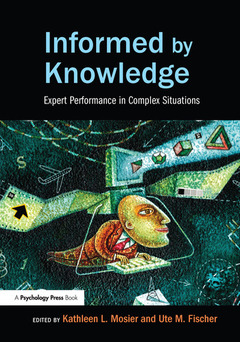Informed by Knowledge Expert Performance in Complex Situations Expertise: Research and Applications Series
Coordonnateurs : Mosier Kathleen L., Fischer Ute M.

The focus of this book is on how experts adapt to complexity, synthesize and interpret information in context, and transform or "fuse" disparate items of information into coherent knowledge. The chapters examine these processes across experts (e.g. global leaders, individuals in extreme environments, managers, police officers, pilots, commanders, doctors, inventors), across contexts (e.g. space and space analogs, corporate organizations, command and control, crisis and crowd management, air traffic control, the operating room, product development), and for both individual and team performance. Successful information integration is a key factor in the success of diverse endeavors, including team attempts to climb Mt. Everest, crowd control in the Middle East, and remote drilling operations.
This volume is divided into four sections, each with a specific focus on an area of expert performance, resulting in a text that covers a wide range of useful information. These sections present well-researched discussions, such as: the management of complex situations in various fields and decision contexts; technological and training approaches to facilitate knowledge management by individual experts and expert teams; new or neglected perspectives in expert decision making; and the importance of ?modeling? expert performance through techniques and frameworks such as Cognitive Task Analysis, computational architectures based on the notion of causal belief mapping such as ?Convince Me,? or the data/frame model of sensemaking.
The volume provides essential reading for researchers and practitioners of Naturalistic Decision Making and those who study Expertise; Organizational and Cognitive Psychologists; and researchers and students in Business and Engineering.
K.L. Mosier, U.M. Fischer, Introduction. Part 1. Managing Complexity: Discussions from Various Fields and Decision Contexts.J. Orasanu, P. Lieberman, Decision Making in Extreme Environments. J. Osland, Expert Cognition and Sense-Making in the Global Organization Leadership Context: A Case Study. H.A. Mieg, Focused Cognition: Information Integration and Complex Problem Solving by Top Inventors. S.J. Perry, R. Wears, Large Scale Coordination of Work: Coping with Complex Chaos within Healthcare. S.G. Hutchins, T. Kendall, The Role of Cognition in Team Collaboration during Complex Problem Solving. P. Badke-Schaub, Decision-Making Processes of Leaders in Product Development. W.R. Sieck, J.L. Smith, A. Grome, D.A. Rababy, Expert Cultural Sensemaking in the Management of Middle Eastern Crowds. P. Thunholm, Managing Complex Military Planning - Processes and Techniques Used by Experienced and Less Experienced Commanders. Part 2. Technological Support and Training for Knowledge Management.P.J. Smith, A.L. Spencer, C. Billings, The Design of a Distributed Work System to Support Adaptive Decision Making across Multiple Organizations. L.D. Strater et al., An Investigation of Technology-Mediated Ad Hoc Team Operations: Consideration of Consideration of Components of Team Situation Awareness. K. Lauche, P.S. Bayerl, Planning, Monitoring and Trouble-shooting: Decision Making in Distributed Drilling Operations. S.S. Kirschenbaum, Expertise in the Submarine Domain: The Impact of Explicit Display on the Interpretation of Uncertainty. L.A. Zimmerman, J.M. Sestokas, C.A. Burns, Using High Fidelity Computerized Training to Prepare Commanders for Operational Decision Making. Part 3.Commentary: Overlooked Issues in Expert Decision Making.D. Snowden, Naturalizing Sense-making. G. Klein, D. Snowden, C.L. Pin, Anticipatory Thinking. S. Fiore, M.A. Rosen, E. Salas, Uncertainty Management and Macrocognition in Teams: A Multi-disciplinary Review and Integration. L. Dibello, D. Lehmann, W. Missildine, How Do You Find an Expert? Identifying Blind Spots and Complex Mental Models among Key Organizational Decision Makers Using a Unique Profiling Tool. L. Alison, M. Eyre, M. Humann, Losing Sight of the ‘Golden Mean’: Accountogenic Decisions in U.K. Policing. Part 4. Outlook: New Methods and Approaches.L. Millitello, W. Wong, S.S. Kirschenbaum, E. Patterson, Systematizing Discovery in Cognitive Task Analysis. P. Falzer, Expertise in Assessing and Managing Risk of Violence: The Contribution of Naturalistic Decision Making. L. Stewart, C.O. Dominguez, L.W. Way, A Data/Frame Sensemaking Analysis of Operative Reports: Bile Duct Injuries Associated with Laparoscopic Cholecystectomy. B.S. Caldwell, S.K. Garrett, Coordination of Event Detection and Task Management in Time-Critical Settings. C. McAndrew, J. Gore, "Convince Me…" An Inter-Disciplinary Study of NDM and Portfolio Managers. M.S. Cohen, Knowns, Known Unknowns, and Unknown Unknowns: Time and Uncertainty in Naturalistic Decision Making.
Dr. Kathleen L. Mosier received her Ph.D. in Organizational Psychology from the University of California, Berkeley, in 1990. From 1990-1997 she was a Senior Research Scientist at NASA Ames Research Center and moved to San Francisco State University in Fall, 1997. Her research focus and areas of expertise include decision making in applied contexts, particularly aviation, human-automation interaction in decision making, and the impact of affective state on decision processes. Dr. Mosier is the 2009-2010 President of the Human Factors and Ergonomics Society, a founding member and officer of the Cognitive Engineering and Decision Making Technical Group, and Associate Editor of the Journal of Cognitive Engineering and Decision Making. She is also past President of the Association for Aviation Psychology.
Dr. Ute M. Fischer received a Ph.D. in Cognitive Psychology from Princeton University in 1990. In 1991 she was awarded an NRC/NAS post-doctoral fellowship at NASA Ames Research Center, and subsequently joined its Human Factors Division as a Senior Research Scientist. Since moving to Atlanta in 1995, she has been a research scientist in the School of Literature, Communication and Culture at the Georgia Institute of Technology. Research activities and areas of expertise include communication and decision making processes of professionals and teams in complex, high-technology environments, in particular in aviation and space and the role of cognitive, social, environmental and organizational factors in distributed decision making.
Date de parution : 11-2015
17.8x25.4 cm
Date de parution : 10-2010
17.8x25.4 cm
Thèmes d’Informed by Knowledge :
Mots-clés :
NDM; naturalistic; Macrocognitive Processes; mental; Macrocognitive Functions; model; CTA; macrocognitive; Vice Versa; processes; Courses Of Action; team; COAs; members; NDM Community; recognition; Team SA; primed; JFACCs; situation; Bile Duct Injury; UK Police; Anticipatory Thinking; NDM Researcher; Team Problem Solving; SA; Situation Awareness; Mental Models; Offshore Staff; Ground Delay Programs; Cm; Air Traffic Control Coordinator; Cystic Duct; CTA Method; UK Definition



